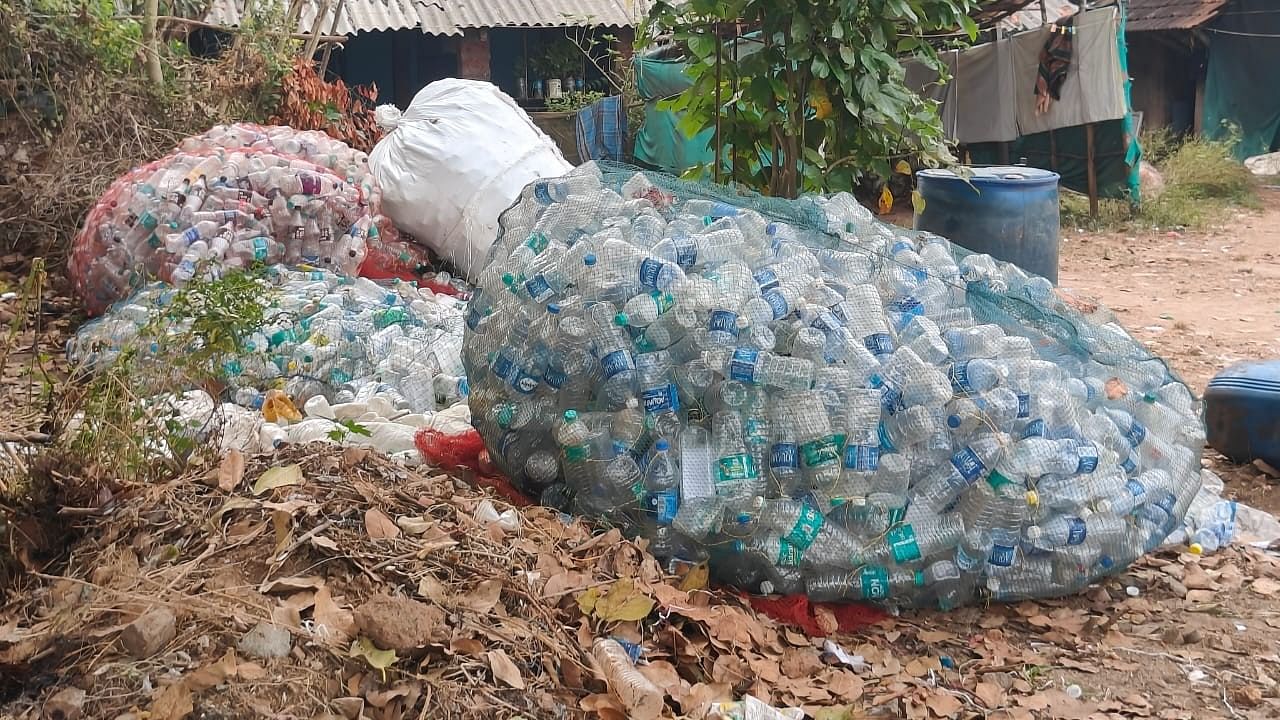
Plastic bottles used by fishermen from Tamil Nadu for capturing squids.
Credit: DH Photo/Ganesh Hegde
Karwar: Chowri fishing, a method where tonnes of used plastic bottles are dumped into the sea to create an artificial reef for catching squids, was banned by the state government in 2012. The Central Marine Fisheries Research Institute banned it later. Yet, this method is being practised in Karwar for the past eight years.
Experts say chowri fishing not only pollutes the sea with discarded plastic bottles but also has a cascading impact on the ecology. These artificial reefs result in multiplication of squid populations, impacting the other marine species.
Fisheries department officials express helplessness in preventing it as they lack human resources. There is also pressure from local politicians to not act against such violators, they say.
Between September and October, skilled fishermen from Tamil Nadu hire boats with local registration numbers to catch squids using overhead lights to attract squid to the shaded area below the boat. Light fishing is also against the established rules.
The Department of Fisheries caught a few violators earlier but let them off after collecting a paltry fine of Rs 5,000. “We are aware that TN fishermen are involved in such illegal fishing,” said Bibin Boppan, Karwar Fisheries Department joint director.
“We are unable to stop this as we lack the staff to conduct raids and confiscate the captured squids. Even if we arrest them, we get a calls from leaders cutting across party lines to release them,” he said.
A local fisherman who did not wish to be named confirms that such a practice is rampant. “What these fishermen are doing in Karwar is illegal at multiple levels. After harvesting, the artificial plastic ‘reef’ is left behind in the sea.”
The squid jigging and placement of artificial reefs occur in the night to avoid detection.
“Earlier, the visiting fishermen used casuarina trees to create such artificial reefs in the sea. However, after forest officials took action against cutting of this tree, fishermen started using plastic,” said Professor Shivakumar Haragi of Karnatak University Department of Marine Biology, Karwar. The reefs are resulting in the breeding of squids throughout the year. These squids prey on smaller fish affecting the fish population.
Mohan Tandel, a local fisherman who lends his boat to visiting fishing communities, explains that many in the region are not aware of these methods of squid hunting. “We lend our boat registration number to TN fishermen who in return pay us Rs 50 per kg of squid caught. This will help in earning Rs 20,000 during the season,” he says.
Locals claim that visiting fishing communities purchase tonnes of plastic bottles from local scrap dealers. One artificial reef requires two sand sacks to anchor around 600 empty bottles for each reef (weighing one quintal) of plastic bottles. These bottles are left floating some 15 to 20 nautical miles into the Arabian Sea to act as breeding grounds for squid. The fishermen sell the squids after harvesting in November and leave behind the artificial reef in the sea itself. Around 150 visiting fishermen engage in chowri fishing during the season.
Vithal K H, a Karwar-based fisherman who lends his boats to TN fishermen said like fishing labourers from Andhra Pradesh, Goa, Maharashtra and Gujarat, the fishermen from Tamil Nadu also come here to work as labourers in their boats. “They are not involved in any form of irregularities.”
Betrik, a fisherman from Nagapattinam in TN, said he is unaware of any irregularities being committed to using artificial reefs to capture squids. “I am a member of a nomadic community. When fish in TN shores reduces, we move to other places catching fish,” he said.